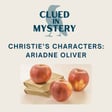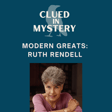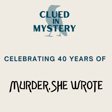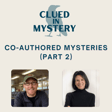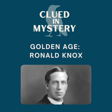Become a Creator today!Start creating today - Share your story with the world!
Start for free
00:00:00
00:00:01

Modern Greats: PD James
To kick off a new season, Brook and Sarah explore the life and writing of PD James, creator of Detective Dalgliesh.
Discussed
Cover Her Face (1962) PD James
Innocent Blood (1980) PD James
Dalgliesh (2021) Acorn TV
Death Comes to Pemberley (2011)
Pride and Prejudice (1813) Jane Austin
Children of Men (1992) PD James
Women of Mystery (2000) Martha Haley DuBose
The Maul and the Pear Tree: The Ratcliffe Highway Murders, 1811 (1971) PD James with Thomas A. Critchley
For more information
Instagram: @cluedinmystery
Contact us: hello@cluedinmystery.com
Music: Signs To Nowhere by Shane Ivers – www.silvermansound.com
Sign up for our newsletter: https://cluedinmystery.com/clued-in-chronicle/
Join the Clued in Cartel: https://cluedinmystery.com/clued-in-cartel/
Transcript
Transcript
Introduction to Clued in Mystery
00:00:12
Speaker
Welcome to Clued in Mystery. I'm Sarah. And I'm Brooke. And we both love mystery. Hi Brooke. Hi Sarah.
Modern Greats Series: P.D. James
00:00:21
Speaker
Today we're continuing our new series of modern greats.
00:00:26
Speaker
I'm very excited about this and we'll be talking about P.D. James. But before that, let me just mention that in the cartel, which is our paid subscription, we are shortly going to be starting a right with us exercise, which is going to be something completely new and completely different for us.
00:00:48
Speaker
Yeah, it's going to be so much fun. And I think a little bit out of both of our comfort zones, but that's what's going to kind of make it great, right? Because we will be sharing what we write, how the story unfolds, uh, as it happens with the cartel members. So this is going to be maybe a week by week, a snippet of what we've created during that time. Yeah, I think it'll be lots of fun. As you say, it will be, um, probably a little uncomfortable, but, um, but lots of fun.
P.D. James's Life and Career
00:01:20
Speaker
So let me begin with a bio of P.D. James. Born in 1920 to outgoing Dorothy May Hone and reserved Sydney Victor James, Phyllis Dorothy James was the eldest of three children. She grew up in Oxford, Ludlow and Cambridge and had lots of freedom to explore, which likely contributed to her imagination.
00:01:44
Speaker
Shortly after the family moved to Cambridge, her mother was institutionalized for an extended period and she took on the responsibility of raising her siblings. James enjoyed school and her sleuth, Adam Delgleish, was named for her favorite teacher, Miss Delgleish. After graduating from high school, she wanted to attend university, but her family couldn't afford it. Instead, she worked in administrative jobs and in a theater where she met the man she would marry, Connor Bantry White.
00:02:14
Speaker
After he qualified as a physician, he enlisted with the Royal Army Medical Corps and was sent to India, during which period James gave birth to their first daughter.
00:02:24
Speaker
After the war, her husband returned, but he was suffering from severe mental illness. He was never formally diagnosed, but spent the next 20 years in and out of institutions until his death by apparent suicide at 44 years old. In 1949, with her husband unable to work, James began working for the new National Health Service. She enrolled in night classes in hospital administration and her career progressed.
00:02:49
Speaker
In the late 1950s, while still taking night classes, caring for her family, including her ailing husband, and working full time, she wrote her first novel. She cited her influences as Dorothy L. Sayers, Marjorie Ellingham, Naya Marsh, and Josephine Tay. Her first novel, Cover Her Face, was published in 1962 and introduces readers to Adam Dalglish, her detective, who appeared in 15 novels between then and 2008.
00:03:15
Speaker
She continued working in the public service spending 11 years with the home office where she would have learned about police investigations and forensics as well as public relations. Her novel Innocent Blood was published in 1980 when James was 60 and she was preparing to retire. She had a pension and savings and was planning to write full-time. When that novel topped the bestseller lists and secured film options, she realized she would be very comfortable in her retirement. And I just love this that she became famous later in life.
00:03:45
Speaker
Her retirement was filled with responsibilities, including being a magistrate in juvenile court, a governor of the BBC, and chair of the Booker Prize judging panel. She taught creative writing and was awarded several honorary university degrees.
00:03:59
Speaker
She became a life peer in 1991, becoming Baroness James and sat in the House of Lords. Her books have won several awards and she received a Lifetime Achievement Award from the British Crime Writers Association in 1987 and the Grandmaster Award from the Mystery Writers of America in 1999. She was also a member of the Detection Club. P.D. James died in 2014 at 94 years old and left us with a number of wonderful books to enjoy.
00:04:29
Speaker
Thank you, Sarah. That was just a great summary. I spent some time researching, knowing that you were going to take the lead in the bio. But I learned so much from that that I didn't come across. And I find P.D. James to be a very fascinating character. One of the things, and you talked about this, was the fact that she didn't really
00:04:54
Speaker
get to go on to higher education like she probably would have liked to. I saw that at 16 she left school, didn't get to go to university because she had these responsibilities to help care for her family. Her mom was ill at that time, I believe. And that she started working in the theater to help provide for her family. And I see that responsibility to care take and provide for others that went on throughout her life.
00:05:24
Speaker
Yeah, absolutely. So her mom, I think, suffered from mental illness as well as her husband. And so, yeah, she just had that responsibility for such a large portion of her life to be caring for other people. And so I think it's so wonderful that it was later in her life that she
00:05:47
Speaker
became successful and really that was when she had the opportunity to appreciate and enjoy that success, right? And nice that she lived such a nice healthy long life so that she got that chance in her life to have some time that was just for her.
Character Exploration and Themes
00:06:08
Speaker
I think I was surprised like if I knew very little about PD James before we started preparing for the show and I
00:06:15
Speaker
I only had read like I think just a little bit and it was a long time ago. So this was all fresh. And I think if I would have guessed, I would have said that she came from a very affluent family because that's kind of how she carries herself, isn't it? She's a very sophisticated, like well-spoken person that I would have assumed she was highly educated and came from, you know, kind of a posh society, but that's not the case at all.
00:06:42
Speaker
No, um, you're right. You know, she, she had, I think pretty humble beginnings and you know, she had to work for a lot of her life to provide for other people. Right. And it was only kind of, yeah, towards the latter part of her life that she, uh, received fame and recognition for, for all of the work that she was doing.
00:07:09
Speaker
Yeah, that's wonderful. I really enjoy that she named her signature sleuth after her favorite teacher. That is just something so endearing, something that you can see that that bookworm child, right? Yeah.
00:07:25
Speaker
The person who loved school, she loved to learn, and this teacher was so important to her that when it came time to name her Sleuth, she took the name. And I believe that his first name is the name of her teacher's father.
00:07:40
Speaker
Uh, I think that's right. And I think, I agree. Like, I think it's so nice that she's honored this person who was so influential in her life with being the, you know, her, her main sleuth. So she did write two other detective novels with a different sleuth named Cordelia Gray. I didn't have a chance to read either of those. I did read a couple of the Dalglish ones though.
00:08:06
Speaker
I just started sampling Cordelia Gray because I thought I really want to get a taste for her before the show. And I think I'm going to love it. I have this feeling that I'm going to be very sad that James only wrote two novels because it's, um, of course they're a little later. They weren't, I wrote, I read some very early Dalglish and so these are written later. Um, and
00:08:30
Speaker
They're more lighthearted and, dare I say, just a little bit more fun than the Delgleish novels that I read, which is not to take away anything from those because I really enjoyed the very elegant and smooth prose that she writes. That carries over, but you've got a very young female PI in Cordelia Gray, so that, of course, is going to flavor the story a little differently.
00:09:01
Speaker
Oh, good. I'm going to have to read. I'm going to have to read those, I think. So I ended up reading the first Dalglish novel and the last one. And what's interesting is so he ages sort of through the series, right?
00:09:23
Speaker
In the last one, he has a cell phone. He's a commander. He's progressed in his career. But I think in the first one, he's kind of in the midpoint of his career. And that would make him quite old if he'd actually aged with time. And so I don't know at what point he kind of
00:09:46
Speaker
stopped aging or she massaged that timeline a little bit. But I do think that's interesting that he didn't stay in the 1970s, for example. In the last book, it was written, I think, in 2008. And so there's reference to world events that have happened around the same time as well.
00:10:11
Speaker
Very interesting. So it's almost a mashup of what we've spoken about before because we have Poirot who doesn't change at all and he stays in his era. And then when we spoke of Marjorie Allingham, her sleuth very much
00:10:26
Speaker
and kind of changes with time, right? Ages as a living person. And then James has done this kind of in-between thing to keep up with the times and yet keep her sleuth young enough to go on all the adventures. I like that a lot.
00:10:44
Speaker
Well, I like it too. And I think it just kind of tells you that there's not any real rules, right? Like you can decide how you do that. And I'd say the first book really felt very much like a Golden Age mystery, right? And in fact, the final book in the series is also a closed circle mystery. And so I don't know if all of them
00:11:13
Speaker
are closed circle.
Adaptations and Final Works
00:11:16
Speaker
I watched, there's a television adaptation, relatively recent, I think it was from 2021. It started, there's a series called Delgleish, and I watched one story from there, and it was also closed circle. So I don't know if all of hers kind of hit on some of those golden age tropes that we've talked about in the past,
00:11:41
Speaker
you can see the kind of progression in the character. And in her writing as well, like if she wrote that in, or it was published in 2008, so she probably wrote it 2006, 2007, she would have been in her 80s at the time. And so a different kind of person. And you just think about how much the world has changed since the 1960s when she would have started writing.
00:12:08
Speaker
It's really interesting to think because her final book was actually published, I think, in 2011. And that's not that long ago when we think about a lot of these authors. When we talk about Agatha Christie or Niall Marsh or Dorothy L. Sayers, some of their books are almost 100 years old. So it's interesting to think of her as being
00:12:32
Speaker
Um, kind of straddling that golden age and, um, more modern crime fiction. Exactly. I watched a short interview with her that the BBC did. It was on her 90th birthday. They spoke with her and she did talk about the fact that
00:12:51
Speaker
She really leaned on that closed circle story because she had worked in these different bureaucracies, um, the hospital administration, and then she did government service. And she understood that these little, um, unique communities, little conclaves of people that, uh, create that closed circle with an office space or, you know, uh, uh,
00:13:17
Speaker
a medical department or something. And so I think she did really master that idea and used her background.
00:13:25
Speaker
Oh, I think she definitely used her background in her writing. You can tell that she's done that in her writing. So the last novel that she wrote was Death Comes to Pemberley, which is a continuation of Pride and Prejudice, but set six years after Pride and Prejudice finishes. And of course, there's a murder.
00:13:49
Speaker
And she was very much a fan of Jane Austen. And I think it's quite fitting that that was her final book.
00:13:57
Speaker
I love that so much. She mentions in this interview that I said that I watched that she was working on something different. And I'm wondering if that's what she's referencing. It doesn't become clear, but I love that so much. And then the interviewer asked her in that clip whether or not she would be writing any more Dalglish. And she said that it was a possibility, but that she hated the idea of dying in the middle of a book.
00:14:27
Speaker
And she said, and at my age, you can't be too sure. So she was a little worried about starting something she couldn't finish, it seems.
00:14:35
Speaker
Oh, that's super interesting. Well, and we talked about Sue Grafton and Marjorie Ellingham leaving unfinished books, unfinished works, right? Yeah, exactly. Another book that she wrote, and I didn't realize this, is The Children of Men. And that was adapted into a film in 2006 with Julianne Moore and Clive Owen.
00:14:59
Speaker
And in that, that's where it's like a futuristic kind of world where there's no reproduction and quite a departure from the mysteries that she was writing.
00:15:14
Speaker
Yeah, you know, she referenced it in this interview, which must've been a good timing for this interview for us to get these nuggets because she said that she read an article about the fact that humans are becoming less and less fertile and it got her mind going. And so here's this woman who does an entirely different genre, goes to a sci-fi. And I just, I just find that so both inspiring and amazing.
00:15:45
Speaker
Yeah. So the book came out in 1992. And so she would have been in her late sixties, early seventies when she was writing it. Yeah. Isn't that amazing and inspiring?
00:15:57
Speaker
Totally.
Writing Process and Influences
00:15:58
Speaker
Yeah. I just find it so interesting that someone who really built their career on detective fiction, um, you know, is willing to try something brand new later in life. And it just goes to show, I think what a skilled writer and, um, very intelligent person she was.
00:16:15
Speaker
So she did also write an autobiography in 1999, and I think she was quite a private person. And it's understandable because honestly, I don't think she had that happy of a life, certainly for that first part while she was, you know, while her mother was institutionalized and then her husband was institutionalized. I think that must have been a very difficult
00:16:44
Speaker
first half of her life. Mm-hmm. Absolutely. It was something that she I think doesn't talk a lot about. It's kind of difficult to even find the references to especially her mother being ill and it must have been
00:17:03
Speaker
a very challenging early life for her. So Sarah, did you learn in your preparations how she went about writing, how she created her stories? So she was a planner. And it was often several years between her Dalglish novels. And that was because she spent months and months
00:17:26
Speaker
just thinking about them, researching facts, thinking up plot points before she even started drafting. I think her family was very religious and I think that kind of stayed with her for her whole life and I wonder if that didn't contribute to some of her outlook on writing and I just have a quote and this is from the book Women of Mystery by Martha Haley DeBose and
00:17:52
Speaker
She has attributed P.D. James as saying, I hope that my books serve as small celebrations of order and reason in our increasingly disordered world. And you can see that in her sleuth, Dalglish. I think he's very, you know, he's very ordered. And I think that was part of her writing process was a very structured process.
00:18:19
Speaker
That's very interesting. I hadn't learned the part about religion in her life, but I also feel like there's a parallel there because we have, um, Dalglish is a poet detective. So we have that softer, um, maybe spiritual side of him along with the ordered, um, you know, very black and white job of being a Scotland yard detective. So, um, you see it coming out in different places. Yeah, I agree.
00:18:50
Speaker
So she was also interested in true crime. She did write a book called The Mall and the Pear Tree, The Ratcliffe Highway Murders, which is murders that happened in the early 19th century. And then she also, in 2013, claimed to have solved a murder that had happened in 1931, which also apparently was the inspiration for one of her own novels.
00:19:21
Speaker
Wow.
00:19:24
Speaker
Yeah. Yeah. So I found, I found several articles that kind of referenced her having made this claim that she had, that she had a theory and in how this murder had happened. Um, and, uh, you know, she is one of several authors that we have spoken about who have kind of dabbled in, um, their own investigations or putting forward their own, uh, theories about actual events.
00:19:53
Speaker
Yes, she's walking in the footsteps of Sir Arthur Conan Doyle when he helped solve some cases and also helped look for Agatha Christie when she was missing. So very interesting, but it also makes sense because these minds that have created these plots
00:20:12
Speaker
can then sometimes dismantle them as well. So I love that. And I'm going to look into that. I would love to know what her theories are and if they were ever followed up on by, uh, by the officials. Yeah, I don't, I don't know the answer to that. Um, I mean, several years had passed since the crime. So, you know, I don't know how much investigating they would have done, but yeah, super interesting.
Reflection and Conclusion
00:20:42
Speaker
Sarah, I loved learning more about P.D. James and she's one of the authors and you know, you and I have spoken and there's several of these and I'm sure we'll highlight more that I know that I should have been reading but hadn't in my life. So I'm just thrilled that we took the time to look into her life and learn more about her.
00:21:03
Speaker
I really enjoyed learning about her Brooke. I think, as you said in the beginning, really fascinating person. And, uh, yeah, like you, I hadn't read very much of hers and, and she's someone that I definitely will, will read more of. Me too. And thank you listeners. I hope that you enjoyed today's episode as well. Thanks for joining us on another Clued In Mystery. I'm Brooke and I'm Sarah, and we both love mystery.
00:21:33
Speaker
Clued In Mystery is written and produced by Brooke Peterson and Sarah M. Stephen. Music is by Shane Ivers. If you liked what you heard, please consider telling a friend, leaving a review, or subscribing with your favorite podcast listening app. Visit our website at cluedinmystery.com to sign up for our newsletter, The Clued In Chronicle, or to join our paid membership, The Clued In Cartel. We're on social media at Clued In Mystery.

![[Re-release] Celebrity Authors image](https://media.zencastr.com/cdn-cgi/image/width=112,quality=85/image-files/61e1c276e3ec42007857cff9/6bf85c27-5b4b-472c-9f00-1aceb11c14f7.jpg)
![[Re-release] Modern Greats: Sue Grafton image](https://media.zencastr.com/cdn-cgi/image/width=112,quality=85/image-files/61e1c276e3ec42007857cff9/6f1dd042-325d-4743-a520-2db110a960b9.jpg)
![[Re-release] Mysteries in Unusual Formats image](https://media.zencastr.com/cdn-cgi/image/width=112,quality=85/image-files/61e1c276e3ec42007857cff9/d8f895fc-5446-494f-b2f8-5a3f6b131e98.jpg)




